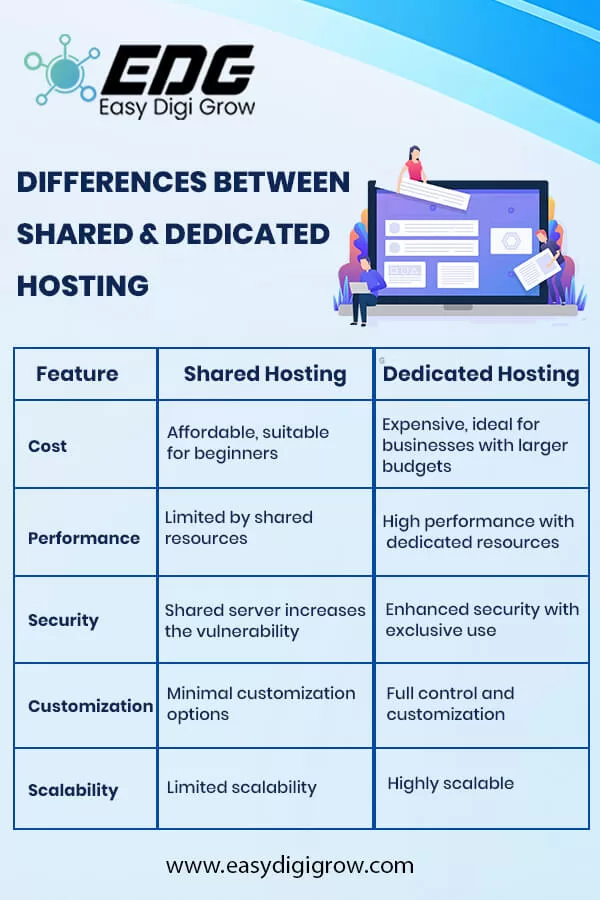When it comes to hosting your website, selecting the correct hosting service can make a significant difference. This selection has an impact on your website’s reliability, speed, and user experience. There are two primary types of hosting options: shared hosting and dedicated hosting. In this article, we’ll explain in depth their distinctions, benefits, disadvantages, and reasons to consider while choosing one to assist you make an informed decision about your website.
What is shared hosting?
Shared hosting is a type of hosting in which numerous websites share the same server and its resources, including CPU, RAM, and bandwidth. This arrangement is comparable to renting an apartment in that you share amenities like a pool, gym, and parking with other renters. It is an affordable solution for those starting small or with modest traffic needs.
Key Features of Shared Hosting:
- Cost-effective: Shared hosting is the most affordable option, making it an ideal choice for small businesses, bloggers, and startups with limited budgets.
- Ease of use: It’s designed for beginners and typically includes user-friendly control panels like cPanel or Plesk for easy website management.
- Shared resources: All websites on the server share the same pool of resources, which can lead to performance issues during peak traffic times.
Pros of Shared Hosting:
- Affordable pricing: Shared hosting is a low-cost option to get your website up and running without making a large upfront commitment.
- Easy setup and maintenance: Most hosting companies provide one-click installation and automatic upgrades.
- No technical expertise required: Perfect for beginners, shared hosting eliminates the need for server management skills.
Cons of Shared Hosting:
- Limited resources: Since resources are shared, your website’s performance may suffer if another site on the server experiences high traffic.
- Security risks: Sharing a server increases vulnerability; if one website is compromised, others may be affected.
- Restricted customization options: You may have limited control over server configurations, which can hinder scalability and specialized needs.
What is Dedicated Hosting?
Dedicated hosting entails assigning your website its server. This structure is analogous to owning a home, in which you have complete control over every aspect of the property, from design to maintenance. Dedicated hosting is known for its high performance and flexibility.
Key Features of Dedicated Hosting:
- Exclusive resources: The server’s CPU, RAM, storage, and bandwidth are entirely dedicated to your website.
- Customizable environment: You have complete control over server options, including the ability to install custom software and optimize settings.
- High performance: Dedicated servers provide unmatched speed, reliability, and uptime.
Pros of Dedicated Hosting:
- Superior performance and speed: Dedicated servers are ideal for high-traffic websites, ensuring that your site runs smoothly even under severe pressure.
- Enhanced security: With sole use of the server, the possibility of intrusions from nearby websites is eliminated.
- Complete control of server configurations: Configure the server to fulfill particular technical specifications.
- Perfect for high-traffic websites: Dedicated hosting is ideal for eCommerce systems, online apps, and resource-heavy websites.
Cons of Dedicated Hosting:
- High cost: Dedicated hosting is significantly more expensive than shared hosting, which can be prohibitive for small businesses.
- Technical expertise required: Managing a dedicated server requires advanced skills or the need to hire a managed hosting service.
- Overkill for small websites: Smaller websites with low traffic may not require the power and resources of a dedicated server.
Differences Between Shared and Dedicated Hosting
| Feature | Shared Hosting | Dedicated Hosting |
| Cost | Affordable, suitable for beginners | Expensive, ideal for businesses with larger budgets |
| Performance | Limited by shared resources | High performance with dedicated resources |
| Security | Shared server increases the vulnerability | Enhanced security with exclusive use |
| Customization | Minimal customization options | Full control and customization |
| Scalability | Limited scalability | Highly scalable |
When to Choose Shared Hosting?
Shared hosting is best suited for:
- Small businesses and personal websites: If your website doesn’t expect heavy traffic or resource-intensive operations, shared hosting is a practical and economical choice.
- Bloggers and beginners: For those just starting their online journey, shared hosting offers simplicity and affordability.
- Low-budget projects: When cost is a primary priority, shared hosting is an excellent starting point.
For example, a small bakery with a simple website displaying meals, contact information, and location can benefit from shared hosting. Because the site does not have high traffic or complex requirements, shared hosting is more than adequate.
When to Choose Dedicated Hosting?
Dedicated hosting is ideal for:
- Major companies and eCommerce websites: Dedicated servers provide improved performance and stability for high-traffic websites, such as online retailers.
- Web applications with special requirements: If your website requires certain specifications, dedicated hosting allows you to customize the server to fulfill those needs.
- Enhanced security requirements: Websites that handle sensitive information, such as financial transactions or personal data, require the comprehensive security features provided by dedicated hosting.
Example:
A multinational eCommerce business that processes thousands of transactions each day and changes inventory in real time would benefit from dedicated hosting. Exclusive resources ensure that activities run smoothly and securely.
What About Virtual Dedicated Servers?
For those seeking a middle ground, Virtual Dedicated Servers (VDS), also referred to as Virtual Private Servers (VPS), is an option. Virtual private servers (VPS) use virtualization technologies to offer dedicated resources inside a shared server environment. This solution finds a middle ground between performance and cost-effectiveness.
Benefits of Virtual Dedicated Servers:
- Cost-effective alternative: VPS hosting is less expensive than dedicated hosting but still provides dedicated resources.
- Customizable: Like dedicated hosting, the server can be configured to meet your requirements.
- Scalability: VPS hosting is extremely scalable, allowing you to increase resources as your website expands.
Factors to Consider When Choosing Hosting:
- Budget:
- Shared hosting is the preferred alternative for individuals with minimal funds.
- Dedicated hosting is more expensive but offers superior performance.
- Website Traffic:
- Small websites with low traffic can thrive on shared hosting.
- High-traffic websites need the power and resources of dedicated hosting.
- Technical Expertise:
- Shared hosting is beginner-friendly and doesn’t require technical skills.
- Dedicated hosting may require advanced knowledge or a managed service.
- Customization Needs:
- Shared hosting offers limited customization.
- Dedicated hosting allows you complete flexibility to fulfill your specific requirements.
- Growth Strategies:
- Small-scale projects can benefit from shared hosting.
- Scalability is provided by dedicated or virtual private server hosting for expanding websites.
Shared Web Hosting vs. Dedicated Web Hosting: SEO Impact
The SEO impact of shared vs. dedicated web hosting is substantial. This is how:
Speed:
Search engines prioritize fast-loading websites. Dedicated hosting ensures optimal speed, giving you an edge in SEO rankings.
Uptime:
- Reliable hosting minimizes downtime, ensuring your site is accessible to both users and search engine crawlers.
Security:
- Shared hosting increases the danger of cross-site contamination, which can result in SEO penalties. Dedicated hosting provides comprehensive security features to protect your website
Conclusion: Which Should You Choose?
The decision between shared hosting and dedicated hosting is based on your website’s requirements, budget, and future growth goals.
- Opt for shared hosting if you’re starting small and need a cost-effective solution.
- Choose dedicated hosting for high-traffic, resource-intensive websites requiring superior performance and security.
- Consider a virtual dedicated server if you’re looking for a balanced option.
- Your hosting decision is a foundational step in your website’s success. Evaluate your needs carefully and invest in a hosting solution that aligns with your goals.
When to Choose Shared Hosting?
Shared hosting is best suited for:
- Small businesses and personal websites: If your website doesn’t expect heavy traffic or resource-intensive operations, shared hosting is a practical and economical choice.
- Bloggers and beginners: For those just starting their online journey, shared hosting offers simplicity and affordability.
- Low-budget projects: When affordability is the top priority, shared hosting provides a great starting point.
Example:
A local bakery with a simple website showcasing menus, contact details, and location can use shared hosting effectively. Since the site doesn’t have heavy traffic or advanced requirements, shared hosting is more than sufficient.
When to Choose Dedicated Hosting?
Dedicated hosting is ideal for:
- Large businesses and eCommerce websites: High-traffic websites, such as online stores, benefit from the superior performance and reliability of dedicated servers.
- Web applications with specific needs: If your website requires custom configurations, dedicated hosting allows you to tailor the server to meet those demands.
- Enhanced security needs: Websites that handle sensitive information, such as financial transactions or personal data, require the robust security measures offered by dedicated hosting.
Example:
An international eCommerce platform with thousands of daily transactions and real-time inventory updates would thrive on dedicated hosting. The exclusive resources ensure smooth performance and secure operations.
What About Virtual Dedicated Servers?
For those seeking a middle ground, Virtual Dedicated Servers (VDS), also known as Virtual Private Servers (VPS), provide a viable alternative. A VPS uses virtualization technology to offer dedicated resources within a shared server environment. This option balances performance and cost-effectiveness.
Benefits of Virtual Dedicated Servers:
- Cost-effective alternative: VPS hosting is more affordable than dedicated hosting while still providing dedicated resources.
- Customizable: Like dedicated hosting, you can configure the server to suit your specific needs.
- Scalability: VPS hosting is highly scalable, allowing you to upgrade resources as your website grows.
Factors to Consider When Choosing Hosting
- Budget:
- Shared hosting is the go-to option for those with limited budgets.
- Dedicated hosting requires a higher investment but provides unmatched performance.
- Website Traffic:
- Small websites with low traffic can thrive on shared hosting.
- High-traffic websites need the power and resources of dedicated hosting.
- Technical Expertise:
- Shared hosting is beginner-friendly and doesn’t require technical skills.
- Dedicated hosting may require advanced knowledge or a managed service.
- Customization Needs:
- Shared hosting offers limited customization.
- Dedicated hosting provides full control to meet specific requirements.
- Growth Plans:
- Shared hosting is sufficient for small-scale projects.
- Dedicated or VPS hosting offers scalability for growing websites.
Shared Web Hosting vs. Dedicated Web Hosting: SEO Impact
Hosting can significantly influence your website’s SEO performance. Here’s how:
- Speed:
- Search engines prioritize fast-loading websites. Dedicated hosting ensures optimal speed, giving you an edge in SEO rankings.
- Uptime:
- Reliable hosting minimizes downtime, ensuring your site is accessible to both users and search engine crawlers.
- Security:
- Shared hosting poses a risk of cross-site contamination, which can lead to SEO penalties. Dedicated hosting offers robust security measures to protect your website.

Conclusion: Which One Should You Choose?
The choice between shared hosting and dedicated hosting depends on your website’s needs, budget, and future growth plans.
- Opt for shared hosting if you’re starting small and need a cost-effective solution.
- Choose dedicated hosting for high-traffic, resource-intensive websites requiring superior performance and security.
- Consider a virtual dedicated server if you’re looking for a balanced option.
Your hosting decision is a foundational step in your website’s success. Evaluate your needs carefully and invest in a hosting solution that aligns with your goals.
 seolounge
seolounge


